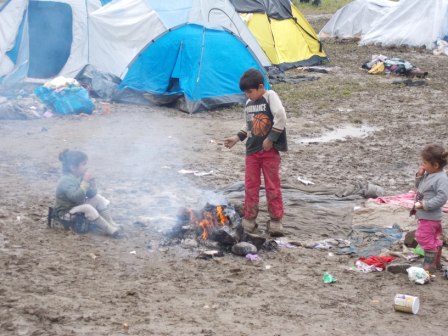The training was opened by the SCRM Ms. Draga Trninic and the representative of the OSCE Ms. Ruzica Banda, followed by the presentation held by Ms. Nermina Dzepar-Ganibegovic from the Ministry of Human Rights and Refugees BiH.
Help representative Ranko Bruic held a presentation briefing the field team members on filling in the forms, control mechanisms and evaluations to be used in the verification process of the RHP beneficiaries during the field visits.
The goal of the one-day training was to provide the field team members with the methodology of beneficiaries’ selection and verification procedures, before the field visits, through presentations, briefings, discussions and experience exchange.
The Regional Housing Programme (RHP) is a joint multi – annual programme aimed at providing durable housing solutions to some 27,000 most vulnerable refugee families in the region (74,000 persons) out of whom 16,780 are residing in Seria (some 45,000 persons).
The RHP in the Republic of Serbia is supported by OEBS and UNHCR and financed by the EU.
The exhibition features selection of the successful examples in the key cooperation areas: infrastructure, democracy, civil society and governance and sustainable economic development. For the most part, the cooperation with Serbia is financed by the Federal Ministry for Economic Cooperation and Development (BMZ).
German Ambassador to Serbia, Axel Dittmann opening the event emphasized that the “goal of the German support to Serbia is its harmonization with the European Union, strengthening economic productivity and improving the standard of living.
For 15 years in Serbia, the organization “Help –Hilfe zur Selbsthilfe” supported foundation and development of over 6000 individual micro and small businesses with in-kind grants, various education business and professional trainings, in addition to the humanitarian assistance and housing solutions for refugees, internally displaced and socially vulnerable local population.
Total value of Help projects implemented in Serbia 1999-2016 amounts over 38 million Euros, half of it being funded through German funds.

Help Programme Manager for South Serbia Ms Masa Bubanj thanked for the gratitude and emphasized that cooperation between public, private and civil sector yield results, the City, ALED, Help beneficiaries and Help.
An example of good practice between those sectors for which Help was recognized was community service performed by the Help beneficiaries in the school “11 October”. Within the Help project “Support to micro businesses in Serbia” all supported beneficiaries performed community service in the School for primary and secondary education “11 October”, in line with their businesses and skills thus contributing to the wider local community.
First session of the dialogue within the initiative for a sustainable growth and employment, was organized by the German organization for international cooperation GIZ and German development bank KfW in cooperation with the Serbian Government and relevant Ministries.
Ms. Milic from Pirot, talked about her experience in start-up business and the support for employment she received from Help . Jasmina’s six-member family, started growing flowers in greenhouses.
The aim of the first session of the dialogue of the German-Serbian initiative for a sustainable growth and employment is exchange of ideas and experiences in order to establish favourable conditions for a quality economic growth and employment, broadening cooperation between German and Serbian companies and improving support to the private sector development.
